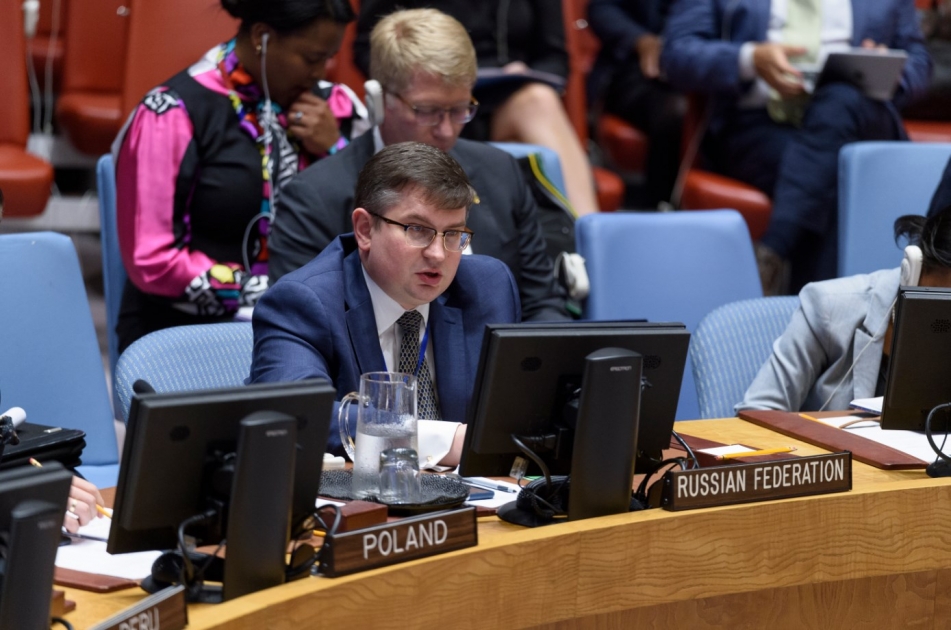Statement by representative of the Russian Federation Alexander Repkin at the UN Security Council meeting on the Central African Republic
Mr. President,
We thank Special Representative of the Secretary-General Mankeur Ndiaye for the information about the situation in the Central African Republic. We have listened with interest to statements by all today’s briefers and to their assessments of the state of affairs in the CAR.
We share the approach that the Political Agreement for Peace and Reconciliation in the Central African Republic dated 6 February is a crucial starting point for further settlement of the situation in the country. The government and the armed groups should use this window of opportunity; and the international community should support them in this endeavor.
In this context, a pivotal role is assigned to the United Nations Multidimensional Integrated Stabilization Mission in the Central African Republic (MINUSCA). We understand that Blue Helmets have a difficult task to perform, taking into account logistics-related obstacles and fragile security situation in the country. There is no doubt that the Mission can count on our comprehensive support.
We see emerging signs of progress in efforts to overcome crisis and move towards national reconciliation. What is important at this stage is to make this process as inclusive as possible, take a well-balanced approach and account for interests of all “players” at the Central African “pitch”.
We support the efforts of President Touadéra aimed at a political dialogue, prompt reform of the security sector, improvement of capacity of armed forces, spread of State institutions throughout the entire area of the country.
We agree that it is necessary to counter impunity; however, the approach should be accurate and compliant with the task of national reconciliation. Issues related to transitional justice and amnesty should be solved at the national level. Auxiliary mechanisms should not undermine the progress in settlement.
Another important issue – practical implementation of the proposal to build so called mixed units that would promote security at the areas controlled by armed groups. We believe implementation of this initiative will contribute to reintegration of combatants and will be beneficial for national reconciliation. We expect that MINUSCA will provide the required assistance.
We stand ready to take active part in the Milti-level Mechanism for monitoring of the implementation of the political agreement. We intend to support the work of committees that address the implementation of peace agreements at the level of prefectures, and the work of the Technical Committee for Security. These mechanisms engage volunteers and representatives of civil society organizations in awareness-raising efforts in the Northern and Northeastern prefectures of the CAR regarding the essence of peace agreements, ways to implement them and their results.
Mr. President,
Russia makes significant contributions to enhancing operational capacity of the Republic’s armed forces. Upon request of the country’s leadership, we provide gratuitous military and technical assistance to Bangui. Upon approval of Security Council Committee 2127, in 2018 Russia’s Ministry of Defense supplied the Republic’s army with small arms and ammunition. The second consignment of military-purpose goods will soon be dispatched.
Upon the Committee’s consent, Russia has sent instructors to train military personnel of the Central African Republic. On 27 April in Berengo, in the presence of the national leadership and representatives of the diplomatic corps, the seventh enrollment of trainees completed their training. They are 318 marine battalion officers of the CAR armed forces. The total number of members of Central African national forces that have been trained by Russian instructors stands at 2236 people, 126 of them being officers. Supreme leadership of the CAR have highly commended their operational capacity on multiple occasions.
Throughout their presence in the CAR, Russian experts have held a number of events aimed at normalizing the humanitarian and social situation, creating favorable conditions for inter-confessional and inter-ethnic dialogue. In the cities of Bria, Ouadda and Mbaïki there have been deployed three hospitals, each of them to admit 300 patients a month and provide humanitarian aid to all those wishing. A humanitarian convoy of over a dozen vehicles has been sent from Khartoum to Bangui through remote and hard-to-reach areas of the CAR.
Russian representatives have taken multiple trips to the Muslim enclave in the vicinity of the main mosque of Bangui in order to deliver humanitarian aid to low-income households and assist in burying the deceased civilians. In Berengo and Bria, they helped to restore worshipping houses. More than 10 roundtables were convened to address the issues of peacebuilding in the CAR. They also organize joint football trainings for players from Muslim and Christian communes.
We will continue to provide all-faceted assistance to the Central African Republic and take robust steps to establish reliable peace in the country. We stand ready to coordinate our efforts with all those who are involved in the search for ways to normalize the situation without any “hidden agenda”.
Thank you for your kind attention.
